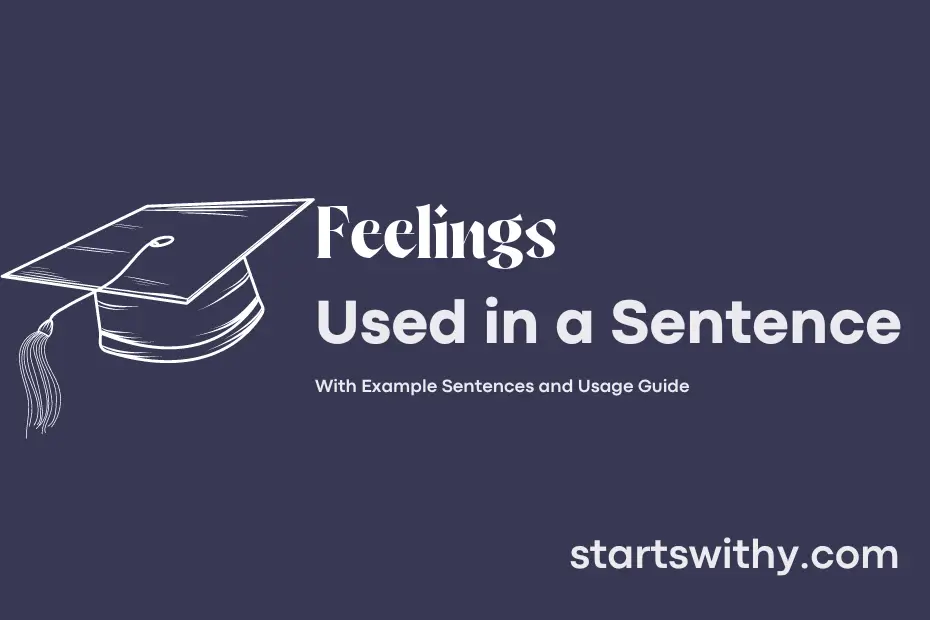Emotions and feelings play a vital role in our daily lives, influencing our thoughts, behaviors, and interactions with others. While often used interchangeably, feelings refer to the conscious experience of an emotional state, encompassing sensations and reactions in response to internal and external stimuli.
These subjective experiences guide us in navigating the world around us, shaping our decision-making processes and forming connections with those around us. Understanding and managing feelings can lead to improved self-awareness, empathy, and overall well-being.
7 Examples Of Feelings Used In a Sentence For Kids
- I am happy when I play with my friends.
- Excited to see a rainbow after the rain.
- Sad when I lose my favorite toy.
- Angry when someone takes my things without asking.
- It’s nice to love and care for our pets.
- Surprised when I see magic tricks.
- Afraid of the dark but feel safe with a nightlight on.
14 Sentences with Feelings Examples
- Feelings of excitement filled the air during the college fest.
- After submitting the assignment, a wave of relief and accomplishment washed over me, replacing the initial feelings of stress.
- Feelings of nervousness crept in as I waited for the results of my exam.
- The warm feelings of friendship blossomed during study group meetings.
- Feelings of disappointment clouded my mind when I missed out on an internship opportunity.
- The professor’s kind words of encouragement sparked feelings of motivation within me.
- Feelings of curiosity compelled me to explore new academic interests.
- Feelings of triumph surged through me as I aced the difficult exam.
- Feelings of gratitude overwhelmed me as my classmates helped me prepare for the presentation.
- The relentless workload led to feelings of burnout and exhaustion.
- Feelings of pride swelled within me as I presented my research findings at the conference.
- The anticipation of graduation stirred up mixed feelings of excitement and nostalgia.
- Feelings of frustration arose when dealing with a difficult group project team.
- The unexpected success of my project proposal brought forth feelings of joy and accomplishment.
How To Use Feelings in Sentences?
To use Feelings in a sentence, first identify the emotion you want to convey. For example, if you want to express happiness, you could say, “I am feeling happy today.”
Next, think about why you are experiencing that emotion. For instance, if you are feeling happy because you received good news, you could say, “The good news made me feel happy.”
It’s important to remember that Feelings are personal and subjective, so be sure to express them in your own words. For example, instead of just saying “I feel sad,” you could elaborate by saying, “I feel sad because I miss my family.”
If you want to express a mix of emotions, you can use words like “but” or “though” to show the contrast. For instance, “I am excited about the trip, but I am also nervous about flying.”
Additionally, you can use adverbs to intensify your Feelings. For example, instead of simply saying “I feel tired,” you could say, “I feel extremely tired after running a marathon.”
In conclusion, be mindful of the Feelings you want to convey, provide context to your emotions, use your unique language to express them, show contrasts if needed, and intensify your Feelings with adverbs for a more vivid expression.
Conclusion
In conclusion, sentences infused with feelings add depth and emotion to communication. Whether expressing joy, sadness, excitement, or anger, these sentences help to convey the speaker’s emotions effectively. When used thoughtfully, they can create a connection with the audience, making the message more relatable and impactful.
By incorporating sentences with feelings, writers and speakers can evoke empathy, stir up memories, and engage their audience on an emotional level. This approach adds a personal touch to the communication, making it more authentic and resonant. Ultimately, the use of sentences with feelings enhances the overall effectiveness of storytelling and communication, allowing for a richer and more meaningful exchange of ideas and emotions.



